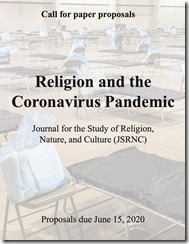If anyone with expertise in connections between sociology of religion and evolutionary/biological sciences is interested in writing an essay for the series described below, please contact me (ldpearce@unc.edu) by noon, Monday, May 18th.
-Lisa
Announcing a new series of short essays on the connection between sociology and the biological and evolutionary sciences. Never has it been more important to re-examine this connection in the light of the current pandemic and its aftermath. The essays will be published in the online magazine This View of Life, which is at the forefront of publishing academically informed content on all aspects of human affairs from an evolutionary perspective. TVOL reaches a diverse audience of academic professionals, public policy experts and the informed general public across the world (typically between 30K-50K pageviews/mo). The essays will be published first individually to be the center of attention and then collected into a special issue for long term visibility (go here for current special issues). We expect that our special issue will provide a foundation for further discussion and exploration of collaborative potential.
The essays should reflect upon the following theme:
A biologically evolved virus finds an environmental niche it can successfully exploit and upends human society. Whether we celebrate or fear modern technology, whether we applaud or dismiss science, whether we view health as a personal or public concern, an invisible pathogen forces us to recognize our interdependence both with the natural world and with each other.
Of course, sociology begins with the importance of social connection, highlights the social processes that shape human outcomes, and takes account of social groups and the cultures they create when explaining human behavior. And we now know that these insights take us back to, not away from, our evolved biology: that the environment influences genetic expression; that culture influences evolutionary change; that the need for group support and social connection are the evolved lodestone of our species and are reflected in the functioning of our brains.
The COVID -19 crisis provides an opportunity for sociologists to reflect upon the history of evolutionary thinking and current understandings in their area, and the potential benefits and costs of a more transdisciplinary vision. These reflections, representing the full diversity of sociological perspectives, will be valuable in their own right in addition to their relevance to the current moment. Hence, explicit connections to the COVID-19 crisis are encouraged but should not overshadow the theme of the past, present, and future of evolutionary thinking in the discipline.
The essays should be approximately 1000 words in length, which is enough for a concise statement and can link to the larger literature. We have flexibility in due dates but would like to receive at least some essays by June 1. Authors will receive guidelines about formatting and other details.
This project is a collaboration between Russell Schutt (current chair of the Evolution, Biology and Society section), Rengin Firat (EBS Council member), David Sloan Wilson (Editor in Chief of TVOL) and Eric Michael Johnson (Managing Editor of TVOL). David has made foundational contributions to theories of social evolution and Eric’s recently completed PhD thesis is on the early impact of Darwin’s Theory on sociological thinking. Russ studies social engagement in relation to organizational functioning and health outcomes, with connections to social neuroscience, evolutionary theory, and psychosocial treatments for serious mental illness. Rengin’s research focuses on inter-group relations and racial disparities of health and well-being with a neurosociological approach.
Lisa D. Pearce
Professor and Interim Associate Chair of Sociology
Faculty Fellow, Carolina Population Center
University of North Carolina at Chapel Hill

